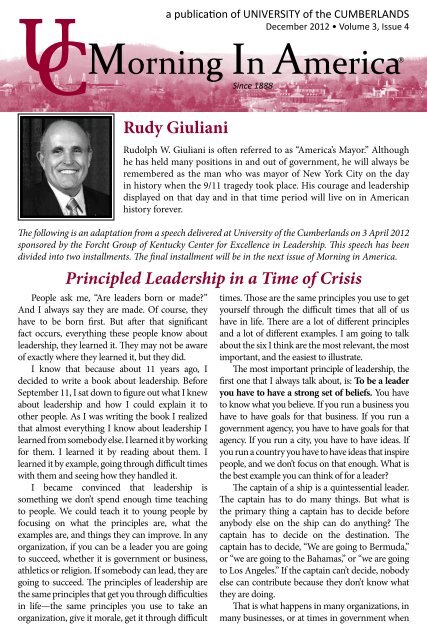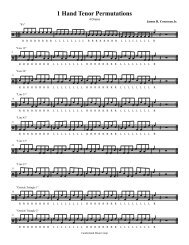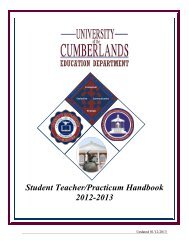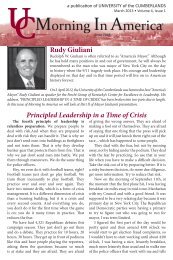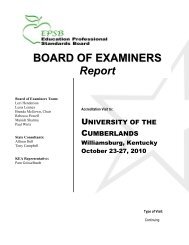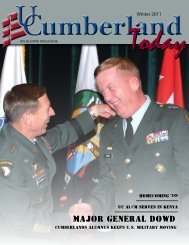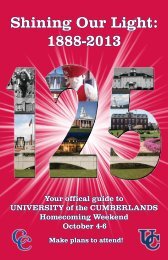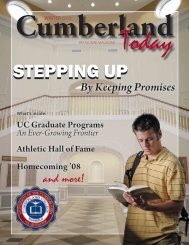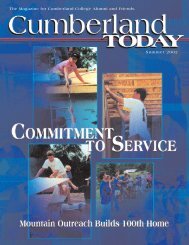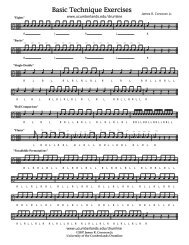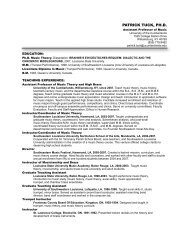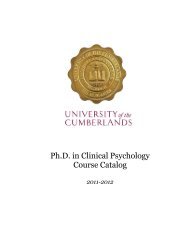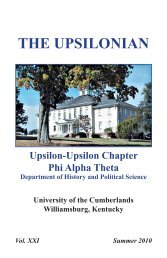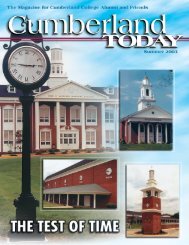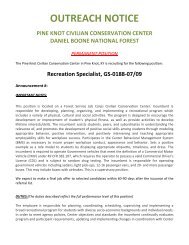Principled Leadership in a Time of Crisis Rudy Giuliani
Principled Leadership in a Time of Crisis Rudy Giuliani
Principled Leadership in a Time of Crisis Rudy Giuliani
Create successful ePaper yourself
Turn your PDF publications into a flip-book with our unique Google optimized e-Paper software.
a publication <strong>of</strong> UNIVERSITY <strong>of</strong> the CUMBERLANDS<br />
December 2012 • Volume 3, Issue 4<br />
®<br />
<strong>Rudy</strong> <strong>Giuliani</strong><br />
Rudolph W. <strong>Giuliani</strong> is <strong>of</strong>ten referred to as “America’s Mayor.” Although<br />
he has held many positions <strong>in</strong> and out <strong>of</strong> government, he will always be<br />
remembered as the man who was mayor <strong>of</strong> New York City on the day<br />
<strong>in</strong> history when the 9/11 tragedy took place. His courage and leadership<br />
displayed on that day and <strong>in</strong> that time period will live on <strong>in</strong> American<br />
history forever.<br />
The follow<strong>in</strong>g is an adaptation from a speech delivered at University <strong>of</strong> the Cumberlands on 3 April 2012<br />
sponsored by the Forcht Group <strong>of</strong> Kentucky Center for Excellence <strong>in</strong> <strong>Leadership</strong>. This speech has been<br />
divided <strong>in</strong>to two <strong>in</strong>stallments. The f<strong>in</strong>al <strong>in</strong>stallment will be <strong>in</strong> the next issue <strong>of</strong> Morn<strong>in</strong>g <strong>in</strong> America.<br />
<strong>Pr<strong>in</strong>cipled</strong> <strong>Leadership</strong> <strong>in</strong> a <strong>Time</strong> <strong>of</strong> <strong>Crisis</strong><br />
People ask me, “Are leaders born or made?”<br />
And I always say they are made. Of course, they<br />
have to be born first. But after that significant<br />
fact occurs, everyth<strong>in</strong>g these people know about<br />
leadership, they learned it. They may not be aware<br />
<strong>of</strong> exactly where they learned it, but they did.<br />
I know that because about 11 years ago, I<br />
decided to write a book about leadership. Before<br />
September 11, I sat down to figure out what I knew<br />
about leadership and how I could expla<strong>in</strong> it to<br />
other people. As I was writ<strong>in</strong>g the book I realized<br />
that almost everyth<strong>in</strong>g I know about leadership I<br />
learned from somebody else. I learned it by work<strong>in</strong>g<br />
for them. I learned it by read<strong>in</strong>g about them. I<br />
learned it by example, go<strong>in</strong>g through difficult times<br />
with them and see<strong>in</strong>g how they handled it.<br />
I became conv<strong>in</strong>ced that leadership is<br />
someth<strong>in</strong>g we don’t spend enough time teach<strong>in</strong>g<br />
to people. We could teach it to young people by<br />
focus<strong>in</strong>g on what the pr<strong>in</strong>ciples are, what the<br />
examples are, and th<strong>in</strong>gs they can improve. In any<br />
organization, if you can be a leader you are go<strong>in</strong>g<br />
to succeed, whether it is government or bus<strong>in</strong>ess,<br />
athletics or religion. If somebody can lead, they are<br />
go<strong>in</strong>g to succeed. The pr<strong>in</strong>ciples <strong>of</strong> leadership are<br />
the same pr<strong>in</strong>ciples that get you through difficulties<br />
<strong>in</strong> life—the same pr<strong>in</strong>ciples you use to take an<br />
organization, give it morale, get it through difficult<br />
times. Those are the same pr<strong>in</strong>ciples you use to get<br />
yourself through the difficult times that all <strong>of</strong> us<br />
have <strong>in</strong> life. There are a lot <strong>of</strong> different pr<strong>in</strong>ciples<br />
and a lot <strong>of</strong> different examples. I am go<strong>in</strong>g to talk<br />
about the six I th<strong>in</strong>k are the most relevant, the most<br />
important, and the easiest to illustrate.<br />
The most important pr<strong>in</strong>ciple <strong>of</strong> leadership, the<br />
first one that I always talk about, is: To be a leader<br />
you have to have a strong set <strong>of</strong> beliefs. You have<br />
to know what you believe. If you run a bus<strong>in</strong>ess you<br />
have to have goals for that bus<strong>in</strong>ess. If you run a<br />
government agency, you have to have goals for that<br />
agency. If you run a city, you have to have ideas. If<br />
you run a country you have to have ideas that <strong>in</strong>spire<br />
people, and we don’t focus on that enough. What is<br />
the best example you can th<strong>in</strong>k <strong>of</strong> for a leader?<br />
The capta<strong>in</strong> <strong>of</strong> a ship is a qu<strong>in</strong>tessential leader.<br />
The capta<strong>in</strong> has to do many th<strong>in</strong>gs. But what is<br />
the primary th<strong>in</strong>g a capta<strong>in</strong> has to decide before<br />
anybody else on the ship can do anyth<strong>in</strong>g? The<br />
capta<strong>in</strong> has to decide on the dest<strong>in</strong>ation. The<br />
capta<strong>in</strong> has to decide, “We are go<strong>in</strong>g to Bermuda,”<br />
or “we are go<strong>in</strong>g to the Bahamas,” or “we are go<strong>in</strong>g<br />
to Los Angeles.” If the capta<strong>in</strong> can’t decide, nobody<br />
else can contribute because they don’t know what<br />
they are do<strong>in</strong>g.<br />
That is what happens <strong>in</strong> many organizations, <strong>in</strong><br />
many bus<strong>in</strong>esses, or at times <strong>in</strong> government when
2<br />
we have leaders that can’t decide. When we have<br />
leaders that try to be all th<strong>in</strong>gs to all people, it is<br />
like the capta<strong>in</strong> <strong>of</strong> a ship that can’t decide. The<br />
ship ends up any place the w<strong>in</strong>ds take it, any place<br />
the storms take it. It could end up some place<br />
good, some place tragic. Don’t you get the feel<strong>in</strong>g<br />
at times that is happen<strong>in</strong>g with our government?<br />
It is go<strong>in</strong>g where the latest poll wants it to go. It is<br />
go<strong>in</strong>g where the latest media enthusiasm wants it to<br />
go. It is not go<strong>in</strong>g someplace that is predeterm<strong>in</strong>ed.<br />
If you feel that way, that largely means that<br />
we don’t have leadership. <strong>Leadership</strong>, first and<br />
foremost, sets a goal. It says “this is where we are<br />
go<strong>in</strong>g.” It says “this year we are go<strong>in</strong>g to expand<br />
our bus<strong>in</strong>ess, take on new areas <strong>of</strong> sales, or new<br />
areas <strong>of</strong> production.” If it is a government agency,<br />
“this year we reduce crime, this year we reduce<br />
unemployment.” You set goals when you lead.<br />
I learned that from Ronald Reagan when I had<br />
the great fortune to work for him for two-and-ahalf<br />
years <strong>in</strong> Wash<strong>in</strong>gton and then all the time I was<br />
United States Attorney. The th<strong>in</strong>g about Ronald<br />
Reagan that has always stuck with me and has been<br />
such a great <strong>in</strong>fluence on my life: Reagan really had<br />
only a few beliefs, but what he believed he believed<br />
very strongly, and he wasn’t swayed about his core<br />
beliefs by what was popular or unpopular.<br />
Ronald Reagan’s ma<strong>in</strong> belief was that<br />
communism was evil, not just another economic<br />
system, not just another social system, not just<br />
another government. And why was it evil? Because<br />
it took away people’s rights that were given to<br />
them, accord<strong>in</strong>g to our belief, by God. The right<br />
to vote; the right to practice your religion or not;<br />
and the right to determ<strong>in</strong>e who represents you.<br />
Communism takes that all away from you. You<br />
don’t have that anymore. Your human rights, your<br />
God-given rights are taken away from you.<br />
To Ronald Reagan that isn’t just an alternative<br />
economic system; it’s about human rights, and<br />
communism was an evil form <strong>of</strong> government.<br />
So Reagan decided to confront communism, not<br />
negotiate with it. You can’t negotiate with evil. If<br />
you do, they take advantage <strong>of</strong> you. Reagan thought<br />
that détente, negotiat<strong>in</strong>g with the communists,<br />
had led us to a very bad and dangerous position,<br />
so <strong>in</strong>stead he confronted them. He built up our<br />
military to its greatest strength s<strong>in</strong>ce World War<br />
II, he took all these missiles and deployed them to<br />
Europe and po<strong>in</strong>ted them at Russian cities.<br />
The day after he did that, ABC did a two day<br />
“Every morn<strong>in</strong>g my faith is restored when I<br />
see the clean cut, mannerly, hard work<strong>in</strong>g,<br />
mounta<strong>in</strong> students walk with purpose,<br />
with head held high, body erect and with<br />
pleasant smiles on their faces.”<br />
President Jim Taylor<br />
docudrama about how this was go<strong>in</strong>g to end the<br />
world. They thought that Ronald Reagan was a war<br />
monger, and he was br<strong>in</strong>g<strong>in</strong>g us as close to nuclear<br />
war as we had been s<strong>in</strong>ce the Cuban Missile <strong>Crisis</strong>.<br />
Then he decided to develop a nuclear shield to<br />
defend Europe and the West. Aga<strong>in</strong> this was go<strong>in</strong>g<br />
to lead to a war. Well, what did it lead to? With<strong>in</strong><br />
one year <strong>of</strong> Reagan leav<strong>in</strong>g <strong>of</strong>fice, the Soviet Union<br />
was gone. The Berl<strong>in</strong> Wall was down. Poland and<br />
the Czech Republic were free.<br />
Ronald Reagan liberated more people than<br />
any American president <strong>in</strong> the twentieth century,<br />
save maybe Frankl<strong>in</strong> Roosevelt. That is a great<br />
achievement, and he did it because he had strong<br />
beliefs. The thought that communism was evil was<br />
not the accepted th<strong>in</strong>k<strong>in</strong>g <strong>in</strong> America when he said<br />
it. Reagan didn’t say this because it was popular.<br />
He didn’t say it because he conducted five public<br />
op<strong>in</strong>ion polls and a focus group. He said it because<br />
he believed it. He said it because it was a sum total<br />
<strong>of</strong> his study, his th<strong>in</strong>k<strong>in</strong>g, his pray<strong>in</strong>g. It came from<br />
him and it wasn’t go<strong>in</strong>g to be changed because<br />
it made him more or less popular. That is a<br />
leader. That is how you def<strong>in</strong>e leadership.<br />
President Ronald Reagan speak<strong>in</strong>g <strong>in</strong> front<br />
<strong>of</strong> the Brandenburg Gate and the Berl<strong>in</strong> Wall<br />
on June 12, 1987.<br />
The second th<strong>in</strong>g Ronald Reagan believed<br />
was that the New Deal had good <strong>in</strong>tentions, but<br />
like many th<strong>in</strong>gs it had gone too far. Rather than<br />
mov<strong>in</strong>g people out <strong>of</strong> poverty, it was lock<strong>in</strong>g them<br />
<strong>in</strong>to dependency on government. Government<br />
had become too big and was keep<strong>in</strong>g people down<br />
rather than giv<strong>in</strong>g them a chance to get up. He was
considered mean, he was considered dumb, he was<br />
considered backward, but he stuck with it because<br />
he really believed it. That eventually led to welfare<br />
reform, a complete change <strong>in</strong> our entitlement<br />
system. It led to tax reductions for the first time <strong>in</strong><br />
twenty or thirty years to lower rates than we even<br />
have today. It led to an economic boom that lasted<br />
for about ten years.<br />
So, the first th<strong>in</strong>g you have to do if you want to<br />
be a leader is to figure out what you believe. You<br />
have to figure out what you want to accomplish. You<br />
can’t lead someone else unless you know where you<br />
want to go. If you don’t know where you want to go,<br />
how are you go<strong>in</strong>g to tell them where to go? So, the<br />
first th<strong>in</strong>g I tell young people is spend a great deal<br />
<strong>of</strong> time read<strong>in</strong>g, th<strong>in</strong>k<strong>in</strong>g, pray<strong>in</strong>g, and talk<strong>in</strong>g to<br />
other people and figure out what is really important<br />
to you and what you want to accomplish. That is<br />
the first pr<strong>in</strong>ciple <strong>of</strong> leadership.<br />
The second pr<strong>in</strong>ciple is: If<br />
you want to be a leader you<br />
have to be an optimist. Now<br />
I know that sounds frivolous<br />
to some people; it sounds like<br />
you should go around tell<strong>in</strong>g<br />
jokes all the time. I don’t mean<br />
that. What I mean by that is you<br />
have to be a problem solver, you<br />
have to be an optimist. Suppose<br />
when I came out here, I started<br />
my speech this way: “[Sigh]<br />
Th<strong>in</strong>gs are bad, th<strong>in</strong>gs are really<br />
bad. The price <strong>of</strong> gasol<strong>in</strong>e, it is<br />
go<strong>in</strong>g to get higher. Iran is go<strong>in</strong>g<br />
to become nuclear. You th<strong>in</strong>k<br />
our economy is gett<strong>in</strong>g better,<br />
but wait and see. You know<br />
th<strong>in</strong>gs are really bad and there<br />
is no hope. None. Follow me.”<br />
Now I didn’t notice anybody<br />
gett<strong>in</strong>g up and follow<strong>in</strong>g me.<br />
Nobody ever does, except <strong>in</strong> one<br />
place: New York.<br />
There is always a little group,<br />
usually on the far left. New<br />
York gets really far left. They<br />
always get up and they just sort<br />
<strong>of</strong> follow me when I say that.<br />
And there is a reason for that:<br />
they follow the person who<br />
is <strong>of</strong>fer<strong>in</strong>g the solution to the<br />
Editor<br />
Eric L. Wake, Ph.D.<br />
Contribut<strong>in</strong>g editor<br />
M.C. Smith, Ph.D.<br />
Advisory Committee<br />
Christopher Leskiw, Ph.D.<br />
Eric L. Wake, Ph.D.<br />
Graphics Editor<br />
Meghann Holmes<br />
Production Manager<br />
Jennifer Wake-Floyd<br />
Staff Assistant<br />
Fay Part<strong>in</strong><br />
Copyright ©2012<br />
UNIVERSITY <strong>of</strong> the CUMBERLANDS<br />
The op<strong>in</strong>ions expressed <strong>in</strong><br />
UC Morn<strong>in</strong>g <strong>in</strong> America® are not<br />
necessarily the views <strong>of</strong><br />
UNIVERSITY <strong>of</strong> the CUMBERLANDS<br />
Permission to repr<strong>in</strong>t <strong>in</strong> whole or<br />
<strong>in</strong> part is hereby granted, provided<br />
the follow<strong>in</strong>g credit l<strong>in</strong>e is used:<br />
“Repr<strong>in</strong>ted by permission from<br />
UC Morn<strong>in</strong>g <strong>in</strong> America®, a publication<br />
<strong>of</strong> UNIVERSITY <strong>of</strong> the CUMBERLANDS.”<br />
problems that they are fac<strong>in</strong>g. So if you want to be<br />
a leader, you have to turn yourself <strong>in</strong>to a problem<br />
solver. You have got to turn yourself <strong>in</strong>to somebody<br />
who th<strong>in</strong>ks solution, not just problem.<br />
There is a tendency that people have when<br />
they are first do<strong>in</strong>g someth<strong>in</strong>g, and they face the<br />
problem for the first time. Let’s say we have a big<br />
case and the other side files its brief. We are go<strong>in</strong>g<br />
to argue the case <strong>in</strong> the Court <strong>of</strong> Appeals and their<br />
brief is really good. The young lawyer k<strong>in</strong>d <strong>of</strong> panics<br />
and wails “we can’t w<strong>in</strong> this case!” Or when I was<br />
mayor, somebody would come runn<strong>in</strong>g <strong>in</strong> a panic<br />
to announce that someth<strong>in</strong>g we had predicted<br />
didn’t happen and our budget was go<strong>in</strong>g to be <strong>in</strong><br />
trouble. I would always say to them, for their good,<br />
not just m<strong>in</strong>e, “Whenever a problem is presented<br />
to you, don’t come and tell me about it unless it is<br />
an emergency and we don’t have any time.” Those<br />
are rare but they happen.<br />
But if we do have time, if we<br />
have an hour, a couple <strong>of</strong> days,<br />
or a week, before you come <strong>in</strong>to<br />
my <strong>of</strong>fice I want you to sit down,<br />
calm down, take a deep breath<br />
and figure out how you would<br />
solve it. I want you to walk<br />
<strong>in</strong>to my <strong>of</strong>fice and tell me, “We<br />
just had a big budget shortfall<br />
because Wall Street had a big<br />
decl<strong>in</strong>e and all <strong>of</strong> our pension<br />
funds are <strong>in</strong> trouble,” and then<br />
I want you to tell me what you<br />
would do about it. Don’t just<br />
give me the problem, give me<br />
the suggested solution. I want<br />
you to tra<strong>in</strong> yourself to do that<br />
every time that happens because<br />
if you do that I am go<strong>in</strong>g to<br />
turn you <strong>in</strong>to a problem solver<br />
from a person that just absorbs<br />
and repeats problems.<br />
You know people who do<br />
that, right? People who just<br />
absorb and repeat problems.<br />
They can sit there for hours<br />
and hours and tell you how bad<br />
th<strong>in</strong>gs are, how terrible th<strong>in</strong>gs<br />
are, how awful they are. And<br />
by the time they have f<strong>in</strong>ished,<br />
th<strong>in</strong>gs are ten times worse than<br />
they really are. But they can’t<br />
3
4<br />
spend any time on figur<strong>in</strong>g out “What the heck<br />
can we do about it?” There is always someth<strong>in</strong>g<br />
you can do about it. The power <strong>of</strong> optimism is<br />
overwhelm<strong>in</strong>g if you want to be a leader. My father<br />
taught me a very long time ago: if you are ever <strong>in</strong><br />
a fire, he used to say, become calm. If you are not<br />
calm, pretend you are. Because you will th<strong>in</strong>k better<br />
if you are calm than if you get nervous and really<br />
upset. I can’t tell you how much that helped me<br />
on September 11. The emotion <strong>of</strong> see<strong>in</strong>g so many<br />
people die, the emotion <strong>of</strong> los<strong>in</strong>g so many friends,<br />
the emotion <strong>of</strong> be<strong>in</strong>g trapped <strong>in</strong> a build<strong>in</strong>g for 15<br />
or 20 m<strong>in</strong>utes and really not know<strong>in</strong>g whether we<br />
would get out.<br />
But every time that happened, I would say to<br />
myself, “I am go<strong>in</strong>g to do what my dad said. I am<br />
go<strong>in</strong>g to pretend I am calm. If I pretend I am calm,<br />
I can th<strong>in</strong>k better for everyone else and also that<br />
will give everyone else an example to rema<strong>in</strong> calm.”<br />
The best th<strong>in</strong>g you can do <strong>in</strong> an emergency is just<br />
rema<strong>in</strong> calm or pretend you are. You are go<strong>in</strong>g to<br />
be able to th<strong>in</strong>k much better, you are go<strong>in</strong>g to be<br />
able to th<strong>in</strong>k, “How do I make this better?”<br />
The third pr<strong>in</strong>ciple <strong>of</strong> leadership is: To be a<br />
leader you have to have courage. Many people<br />
are <strong>in</strong> awe <strong>of</strong> the pr<strong>in</strong>cipal quality <strong>of</strong> courage<br />
because they th<strong>in</strong>k it is only for people who have<br />
no fear. They th<strong>in</strong>k <strong>of</strong> it as the<br />
person who w<strong>in</strong>s the Medal<br />
<strong>of</strong> Honor, or the firefighter<br />
who runs <strong>in</strong>to a build<strong>in</strong>g to<br />
save someone, or the police<br />
<strong>of</strong>ficer who goes <strong>in</strong>to gunfire<br />
to pull someone out. They<br />
look at these heroes and they<br />
th<strong>in</strong>k “I am not like that; I<br />
would be afraid.” But courage<br />
is much more common than<br />
you th<strong>in</strong>k. Most people have<br />
it. We just don’t understand it.<br />
Courage is not the absence<br />
<strong>of</strong> fear. Any firefighter who is<br />
not afraid to run <strong>in</strong>to a burn<strong>in</strong>g<br />
build<strong>in</strong>g is not courageous—<br />
he’s crazy, right? Of course he<br />
is afraid. Of course a soldier is<br />
afraid to go to battle. We are<br />
all afraid. Anyone who is not<br />
afraid <strong>in</strong> this room, raise your hand and go to the<br />
psychology department, because you need help.<br />
You should be afraid. Life is risky. When dangerous<br />
A New York City firefighter<br />
purveys the rema<strong>in</strong>s <strong>of</strong> the<br />
World Trade Center on 9/11.<br />
th<strong>in</strong>gs happen, they are dangerous. If you are not<br />
afraid, you become reckless. Fear is an enormously<br />
valuable emotion because it warns you <strong>of</strong> danger.<br />
What def<strong>in</strong>es courage is what you do with<br />
that fear, not whether you have it. If you let<br />
fear immobilize you, then you are not go<strong>in</strong>g to<br />
accomplish anyth<strong>in</strong>g. But if you let fear motivate<br />
you to work harder to reduce the risk, then it<br />
makes you a courageous person. If you are able to<br />
overcome it so that you can do what you have to do,<br />
then you will be a successful person.<br />
When I was the mayor <strong>of</strong> New York, whenever<br />
one <strong>of</strong> our uniformed services did someth<strong>in</strong>g<br />
particularly heroic I would br<strong>in</strong>g them to City<br />
Hall that day or as soon as they were capable, and<br />
I would hold a press conference and expla<strong>in</strong> what<br />
they did. I wanted people to see what these people<br />
who risked their lives to protect others are really<br />
like. Because if sometimes someth<strong>in</strong>g goes wrong,<br />
or even when sometimes they do someth<strong>in</strong>g wrong,<br />
that becomes the big headl<strong>in</strong>e. What happens daily<br />
is they save people.<br />
So I thought I could balance that by hav<strong>in</strong>g<br />
these press conferences. I’ll never forget the first<br />
time this happened. It was a police <strong>of</strong>ficer who had<br />
jumped <strong>in</strong>to the East River <strong>in</strong> January or February<br />
to rescue a person who had fallen <strong>in</strong>to the river. He<br />
saved the person’s life. It was<br />
a tremendous th<strong>in</strong>g to do, to<br />
take the risk <strong>of</strong> dy<strong>in</strong>g from<br />
hypothermia himself.<br />
It led me to the pr<strong>in</strong>ciple<br />
about how courage and fear<br />
can work for you—If you are<br />
afraid <strong>of</strong> fail<strong>in</strong>g <strong>in</strong> bus<strong>in</strong>ess, or<br />
you are a firefighter and you<br />
are afraid to go <strong>in</strong>to fire, or<br />
you are a soldier and you are<br />
afraid to go <strong>in</strong>to battle—how<br />
do you deal with that fear? I<br />
th<strong>in</strong>k here is the way we deal<br />
with that fear. “Be prepared,” it<br />
is called. Anticipat<strong>in</strong>g fear and<br />
understand<strong>in</strong>g fear allows you<br />
to show courage when it is<br />
needed to lead.<br />
[We hope you have enjoyed<br />
the first <strong>in</strong>stallment <strong>of</strong> Mayor <strong>Giuliani</strong>’s presentation.<br />
Be sure to watch for the conclusion <strong>in</strong> the next edition<br />
<strong>of</strong> Morn<strong>in</strong>g <strong>in</strong> America. —eds.]
Rest <strong>in</strong> Peace<br />
The Patriot Guard stands along a funeral<br />
route to honor a fallen soldier.<br />
This account was written by Dr. Melv<strong>in</strong><br />
“Chuck” Smith, an associate pr<strong>of</strong>essor <strong>of</strong> history at<br />
University <strong>of</strong> the Cumberlands.<br />
Sergeant David K. Cooper was mortally<br />
wounded by small arms fire while on dismounted<br />
patrol <strong>in</strong> Qadasiyah, Iraq. He died <strong>of</strong> these wounds<br />
<strong>in</strong> Baghdad on 27 August, 2008.<br />
On Sunday, 7 September 2008, Sergeant<br />
Cooper was laid to rest <strong>in</strong> Jellico, Tennessee, follow<strong>in</strong>g<br />
funeral services <strong>in</strong> nearby Williamsburg,<br />
Kentucky. The Patriot Guard attended the services<br />
and provided escort from the funeral home to<br />
the cemetery at the family’s request. The Patriot<br />
Guard are motorcycle riders who, at a family’s request,<br />
attend the funeral <strong>of</strong> a fallen service member<br />
or civilian police or firemen. They will serve<br />
as a flag l<strong>in</strong>e to honor the fallen and ride as escort<br />
to the graveside, and sometimes stand as a barrier<br />
between the funeral party and protest groups.<br />
I am not a regular member <strong>of</strong> the Patriot<br />
Guard. I am a resident <strong>of</strong> Williamsburg, however,<br />
and asked permission from the Ride Capta<strong>in</strong><br />
to stand with the Guard and to ride escort, both<br />
<strong>of</strong> which were granted. We arrived at the funeral<br />
home shortly after noon and established a flag l<strong>in</strong>e<br />
(riders hold<strong>in</strong>g 3 x 5 American flags on staves) on<br />
the perimeter <strong>of</strong> the funeral home park<strong>in</strong>g lot, fac<strong>in</strong>g<br />
the area reserved for the threatened protest by<br />
the Westboro Church cultists. I wasn’t at the airport<br />
when Sergeant Cooper’s casket arrived on<br />
Thursday, but I am told that four <strong>of</strong> these people<br />
did show up there.<br />
There was little traffic <strong>in</strong> downtown Williamsburg<br />
on a Sunday afternoon; the churchgoers had<br />
already headed home by the time we deployed, and<br />
most folks were about gett<strong>in</strong>g their Sunday d<strong>in</strong>ners.<br />
We stood vigil until the funeral party arrived and<br />
the service got under way, shortly after 2:00 p.m. It<br />
was very hot and muggy, very uncomfortable.<br />
Once the service f<strong>in</strong>ished and we paid our<br />
respects to Sergeant Cooper and his family, we<br />
formed another flag l<strong>in</strong>e around the rear <strong>of</strong> the<br />
funeral home and the hearse. This is done <strong>in</strong> case<br />
there are any protestors who want to disrupt the<br />
ceremony or hurl curses at the family <strong>of</strong> the deceased.<br />
It is the Patriot Guards’ desire to <strong>in</strong>terpose<br />
themselves between the family and those who have<br />
no respect for the dead, that <strong>in</strong>stead <strong>of</strong> see<strong>in</strong>g hatred<br />
and vitriol, they will see respectful flag-bearers.<br />
We were fortunate that no <strong>in</strong>cidents occurred<br />
dur<strong>in</strong>g the service. With this complete, we stowed<br />
flags and mounted up to escort Sergeant Cooper<br />
to the cemetery <strong>in</strong> Jellico, some fifteen miles away,<br />
right about 3:30 p.m.<br />
We couldn’t see Williamsburg’s Ma<strong>in</strong> Street from<br />
where we staged the bikes or from either <strong>of</strong> the flag<br />
l<strong>in</strong>es. As we turned on to Ma<strong>in</strong> I felt a surge <strong>of</strong> anger.<br />
Williamsburg, like a lot <strong>of</strong> small towns, holds<br />
a Fall Festival—here it is called “Old Fashioned<br />
Trade Days.” They close <strong>of</strong>f Ma<strong>in</strong> Street, put up a<br />
lot <strong>of</strong> canopied booths and display their quilts and<br />
pickles, raffle <strong>of</strong>f a shotgun or two, and fill up on<br />
carnival food. Trade Days began on 4 September<br />
and ran through Sunday. When we turned on to<br />
Ma<strong>in</strong>, there were the canopies, there were the people.<br />
I thought to myself, “Can’t these people show<br />
some respect?”<br />
And then I saw that they weren’t look<strong>in</strong>g at<br />
quilts or buy<strong>in</strong>g Polish sausages. They l<strong>in</strong>ed the<br />
streets four and five deep, almost all <strong>of</strong> them hold<strong>in</strong>g<br />
American flags or signs express<strong>in</strong>g their gratitude<br />
to Sergeant Cooper or their condolences for<br />
his family. There was no festival atmosphere <strong>in</strong> the<br />
crowd, no jaunty wav<strong>in</strong>g <strong>of</strong> flags, no rah-rah momentary<br />
patriotism.<br />
This was a community bidd<strong>in</strong>g farewell to one<br />
<strong>of</strong> their own sons.<br />
We rode on through downtown and crossed<br />
the tracks and climbed the hill that runs parallel<br />
to the University <strong>of</strong> the Cumberlands campus. The<br />
crowd had grown th<strong>in</strong>ner as we got close to the<br />
5
6<br />
tracks, but only because there aren’t many good<br />
places to stand right there. As we approached campus<br />
the numbers picked back up aga<strong>in</strong>, students and<br />
townies stand<strong>in</strong>g together to honor a fallen soldier.<br />
There were no protestors.<br />
We rode between packed sidewalks up to the<br />
traffic light by the high school, turned left and proceeded<br />
to l<strong>in</strong>k up to Kentucky Highway 92.The<br />
crowd th<strong>in</strong>ned out at this po<strong>in</strong>t; only the occasional<br />
house owner stood <strong>in</strong> his yard or on his porch as<br />
we passed. We turned on to Highway 92, then on<br />
to US Highway 25W, the old ma<strong>in</strong> road from Williamsburg<br />
to Jellico.<br />
Another huge crowd <strong>of</strong> mourners greeted us<br />
as we reached this corner, packed <strong>in</strong>to the park<strong>in</strong>g<br />
lot <strong>of</strong> the Dollar General Store and the Save-a-Lot<br />
grocery and the car dealership. A ladder truck was<br />
parked there, ladder extended and fly<strong>in</strong>g a flag the<br />
size <strong>of</strong> a pickup truck. We rode between packed<br />
crowds for the better part <strong>of</strong> a mile before gett<strong>in</strong>g<br />
out <strong>of</strong> Williamsburg.<br />
But at each little community between Williamsburg<br />
and Jellico there was another solemn<br />
crowd. Each volunteer fire department we passed<br />
had their eng<strong>in</strong>e run out, their flag at half mast, and<br />
their volunteers turned out and render<strong>in</strong>g honors<br />
as we passed. Every little crossroads had a knot <strong>of</strong><br />
mourners stand<strong>in</strong>g vigil. In some places it was a<br />
s<strong>in</strong>gle <strong>in</strong>dividual or s<strong>in</strong>gle family, solemnly hold<strong>in</strong>g<br />
a flag and stand<strong>in</strong>g to honor Sergeant Cooper.<br />
As we crossed <strong>in</strong>to Tennessee we ran <strong>in</strong>to<br />
packed sidewalks aga<strong>in</strong>, thousands <strong>of</strong> people l<strong>in</strong>ed<br />
up to pay their respects as the hearse passed. We<br />
escorted the graveside party through town and up<br />
to the high and lonesome cemetery where, with a<br />
guard <strong>of</strong> honor from the Whitley County Junior<br />
ROTC program, a funeral detail <strong>of</strong> Army Regulars,<br />
and full military ceremony, Sergeant David K.<br />
Cooper was returned to the native soil from which<br />
he had sprung 25 years earlier.<br />
I was honored to be allowed to pay my respects<br />
and stand vigil over this young man. I was<br />
touched by the quiet dignity with which his family<br />
endured the services and laid their son and brother<br />
to rest. But my heart was both broken and mended<br />
by the public display <strong>of</strong> respect and shared grief<br />
that attended Sergeant Cooper’s funeral.<br />
It was a hot Sunday. It was muggy <strong>in</strong> the way<br />
that only the American Southeast can produce. The<br />
service itself ran long at the funeral home. These<br />
people who l<strong>in</strong>ed the streets and the highway stood<br />
<strong>in</strong> that heat for a couple <strong>of</strong> hours, all for the brief<br />
moment <strong>in</strong> which they could pay their respect to<br />
the family as the funeral procession passed by.<br />
And there were thousands <strong>of</strong> them. Williamsburg<br />
is a town <strong>of</strong> perhaps 5,000 people. Jellico is<br />
about 3,000. Yet there were literally thousands <strong>of</strong><br />
people turned out to honor this young man.<br />
And they were s<strong>in</strong>cere. David K. Cooper was<br />
not a Medal <strong>of</strong> Honor w<strong>in</strong>ner, nor a dist<strong>in</strong>guished<br />
general with decades <strong>in</strong> uniform, nor a veteran<br />
who had returned to his home town and spent<br />
years <strong>in</strong> public service. He wasn’t a celebrity. He<br />
was just one <strong>of</strong> us.<br />
Just. One. Of. Us.<br />
And so we honored his pass<strong>in</strong>g. Even if we<br />
had never met him <strong>in</strong> life, we wept the tears as if<br />
we were lay<strong>in</strong>g our own blood and our own bone<br />
to rest. We stood <strong>in</strong> solemn review as he passed by.<br />
We felt the grief <strong>in</strong> a young life ended, but that grief<br />
was tempered with the fierce pride <strong>in</strong> a young life<br />
not wasted.<br />
To those who th<strong>in</strong>k America has lost its way, you<br />
should have been there; you would have seen the soul<br />
<strong>of</strong> a people reach<strong>in</strong>g out to hold those who grieve.<br />
To those who th<strong>in</strong>k America has lost its heart,<br />
you should have been there; you would have seen the<br />
beat<strong>in</strong>g heart <strong>of</strong> the nation puls<strong>in</strong>g deep and true.<br />
Choose Cumberlands<br />
Chartered <strong>in</strong> 1888, University <strong>of</strong> the Cumberlands<br />
is an <strong>in</strong>stitution <strong>of</strong> regional dist<strong>in</strong>ction, which<br />
currently <strong>of</strong>fers four undergraduate degrees <strong>in</strong><br />
more than 40 major fields <strong>of</strong> study; n<strong>in</strong>e prepr<strong>of</strong>essional<br />
programs; twelve graduate degrees,<br />
<strong>in</strong>clud<strong>in</strong>g two doctorate, two specialist and eight<br />
master’s degrees; certifications <strong>in</strong> education; and<br />
onl<strong>in</strong>e programs.<br />
Listed as a “TopTier” <strong>in</strong>stitution by US News and<br />
World Report, our graduates enjoy a high acceptance<br />
rate to graduate and pr<strong>of</strong>essional schools.<br />
In fact, with<strong>in</strong> five years <strong>of</strong> graduation, 66% <strong>of</strong><br />
our graduates have completed or are pursu<strong>in</strong>g a<br />
graduate or pr<strong>of</strong>essional degree.<br />
If you or someone you know might be <strong>in</strong>terested<br />
<strong>in</strong> our programs, please visit our website at<br />
www.ucumberlands.edu or contact Erica Harris<br />
by email at erica.harris@ucumberlands.edu or<br />
by phone at 606.539.4241. She will be happy to<br />
provide you with <strong>in</strong>formation and an admissions<br />
application. We hope to have the opportunity to<br />
serve you.
You can remember Cumberlands <strong>in</strong> your will or trust, or you might want to create a charitable<br />
gift annuity to provide you with a lifetime <strong>in</strong>come as you assist deserv<strong>in</strong>g students.<br />
With charitable gift annuities:<br />
• The rates are significantly greater than bond rates and certificates <strong>of</strong> deposits.<br />
• Annuity payments are fixed and based on the age(s) <strong>of</strong> the annuitant(s).<br />
• Annuity payments are extremely favorably taxed.<br />
• The donor is entitled to an <strong>in</strong>come tax charitable contribution deduction.<br />
• Appreciated securities given to Cumberlands for a charitable gift annuity are<br />
valued on the date <strong>of</strong> the gift; capital ga<strong>in</strong>s taxes are not immediately due as they are when<br />
securities are sold by the donor.<br />
• A gift annuity is the simplest <strong>of</strong> all split-<strong>in</strong>terest planned gifts.<br />
A Charitable Gift Annuity will not only provide you a fixed <strong>in</strong>come, guaranteed for life, but also<br />
will create a significant legacy here at University <strong>of</strong> the Cumberlands.<br />
University <strong>of</strong> the Cumberlands <strong>of</strong>fers numerous planned giv<strong>in</strong>g vehicles guarantee<strong>in</strong>g <strong>in</strong>come<br />
for the rema<strong>in</strong>der <strong>of</strong> life. Some have established trusts and deferred gift annuities nam<strong>in</strong>g a<br />
loved one as the <strong>in</strong>come<br />
beneficiary. With the low<br />
payout rates currently<br />
on certificates <strong>of</strong> deposit<br />
(CDs) and the volatility <strong>of</strong><br />
the stock market, deferred<br />
gift annuities are becom<strong>in</strong>g<br />
extremely popular for<br />
young adults who will not<br />
be retir<strong>in</strong>g any time soon<br />
but want to plan and secure<br />
a steady, fixed <strong>in</strong>come that<br />
will beg<strong>in</strong> when they retire.<br />
For <strong>in</strong>stance, a 45-year-old<br />
can defer a gift annuity<br />
for 15 years and receive<br />
Remember Cumberlands<br />
Age<br />
Yearly<br />
Rate<br />
Annuity<br />
Payment<br />
Charitable<br />
Deduction<br />
65 4.7% $470 $2,661.10<br />
70 5.1% 510 3,469.30<br />
75 5.8% 580 4,101.60<br />
80 6.8% 680 4,669.30<br />
85 7.8% 780 5,418.90<br />
*based on m<strong>in</strong>imum age <strong>of</strong> 65; a gift annuity <strong>of</strong> $10,000; figures for<br />
annual payment & IRS discount rate <strong>of</strong> 1.2% as <strong>of</strong> November, 2012.<br />
<strong>in</strong>come at a rate <strong>of</strong> 6.67% percent for life. The charitable gift tax deduction would be immediate<br />
(dur<strong>in</strong>g work<strong>in</strong>g years when your tax bracket is higher) and the <strong>in</strong>come would not beg<strong>in</strong> until you<br />
are 60. As with regular gift annuities, the entire amount <strong>of</strong> the annuity would be backed by all <strong>of</strong> the<br />
University’s assets.<br />
If you are consider<strong>in</strong>g the establishment <strong>of</strong> a Charitable Gift Annuity to provide life-long<br />
<strong>in</strong>come for yourself and vital support for University <strong>of</strong> the Cumberlands, please contact Jim Taylor<br />
at pres<strong>of</strong>f@ucumberlands.edu.<br />
Remember, as a f<strong>in</strong>ancial supporter <strong>of</strong> Cumberlands, you are encourag<strong>in</strong>g today’s students as you<br />
also demonstrate your cont<strong>in</strong>u<strong>in</strong>g commitment to the University’s mission to educate <strong>in</strong>dividuals for<br />
lives <strong>of</strong> responsible service and leadership.<br />
7
6191 College Station Drive • Williamsburg, Kentucky 40769<br />
NON-PROFIT ORG<br />
U.S. POSTAGE<br />
PAID<br />
LOUISVILLE, KY<br />
PERMIT #879<br />
“Ethical <strong>Leadership</strong>”<br />
“Ethical <strong>Leadership</strong>”<br />
with<br />
Charles Krauthammer<br />
Charles Krauthammer has won a Pulitzer Prize and been named by<br />
F<strong>in</strong>ancial <strong>Time</strong>s as the most <strong>in</strong>fluential commentator <strong>in</strong> America. He<br />
has been honored for his commentary from every side <strong>of</strong><br />
the political spectrum. He has been described by MSNBC’s<br />
Joe Scarborough as “without a doubt the most powerful<br />
force <strong>in</strong> American conservatism.”<br />
Tuesday, April 9, 2013 at 7:00 p.m.<br />
O.Wayne Roll<strong>in</strong>s Center • Williamsburg, Kentucky<br />
Reserve your free ticket(s) by call<strong>in</strong>g theUniversity <strong>of</strong> the Cumberland’s ticket l<strong>in</strong>e at (606)539-4432.<br />
Ticket l<strong>in</strong>e opens March 1, 2013


